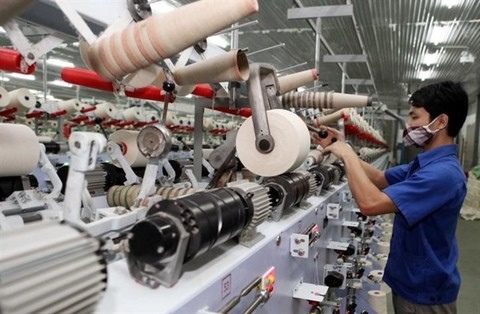Less working hours not feasible, businesses say
Less working hours not feasible, businesses say
Many companies disagree with a proposal to cut weekly working hours to 44, saying the move would create more problems, not solve them.

At a meeting held in Hanoi Monday on draft amendments to the Labor Code, business representatives expressed concerns about a proposal by the Vietnam General Confederation of Labor to cut working hours for laborers by four hours to 44 per week.
Under current regulations, workers will not have to work over 48 hours per week.
Phan Thi Thanh Xuan, vice chairwoman of the Vietnam Leather, Footwear, and Handbag Association, said the industry she is working in uses 1.5 million laborers and at the moment, is having difficulties recruiting new staff.
If the working hours are cut now, companies in the sector will have to hire more employees, and if they don’t, they will have to invest more in equipment and machinery to ensure output. Either way, companies will suffer higher production costs.
The association has calculated that at 44 hours per week, footwear firms will have to recruit 10 percent more workers, which is a hard job. Finding new staff for the footwear and leather sectors has become problematic these days. It is common that factories making shoes and bags are now using many workers in their 50s.
Xuan agreed that cutting working hours means more time to relax, but unskilled workers are likely to use the extra time drinking or doing extra jobs, like registering as a driver for some ride-hailing firms.
Their major source of income, as a result, will drop as their working time decreases.
Tran Thi Lan Anh, director of the Bureau for Employers' Activities under the Vietnam Chamber of Commerce and Industry (VCCI), said most countries with 40-44 hour working weeks are developed ones.
In developing countries that are in "fierce competition" against Vietnam, like Thailand, India, Bangladesh, Malaysia, the Philippines and Laos, the working hours are all 48 hours per week.
A VCCI survey of 18 nations, including ten Southeast Asians and other Asians with socio-economic conditions similar to Vietnam found that six had under 48 working hours per week, 11 had 48 hours per week and South Korea had it at 52.
Anh said that even with the existing rule of 48 hours per week, many companies had to ask employees to work overtime to meet market demand.
Therefore, if the working time was cut, businesses would not be able to satisfy their customers, which, in turn, would affect their brand name and image. Firms making products for export would be particularly affected, she said.
Dao Thi Thu Huyen, representative of the Japanese Chamber of Commerce and Industry in Vietnam, said Vietnam will remain attractive to foreign investors if its workers are skillful and hardworking. If the working time per week is cut, investors could move to other markets, she added.
"Japanese people work until they are 67 years old; Vietnamese are already less productive than them and now we want to work even less. We should only take more time to rest when we post higher economic growth and enjoy higher per capita incomes," said Nguyen Xuan Duong, deputy chairman of Vietnam Textile and Apparel Association.
Duong said countries around Vietnam allow 600 hours of overtime each year per worker. Japan has it at 700 hours, Malaysia has no limits, but Vietnam limits it to less than 300 hours.
When foreign investors find that are likely to violate the overtime rule in Vietnam, they could take their production chains to other markets, he said.
Vu Tien Loc, chairman of VCCI, said that a nation whose economic growth relies on many industrial sectors has to make its labor competitive, which means that now was not the right time to cut working hours.
Bui Sy Loi, deputy chairman of the Committee on Social Affairs of the legislative National Assembly, said his view was that the working hours should not be cut right now, because the productivity of Vietnamese laborers was still low.
He even suggested granting industries such as footwear and textiles the permission to add more working time for its workers to meet export demands.
Ngo Duy Hieu, the Vietnam General Confederation of Labor's vice chairman, said cutting working time was a "progressive" move alongside development forces that can ensure increased productivity, met business conditions, and at the same time, offer healthy working conditions for workers.
81 percent of around 1,300 workers in an online survey conducted last week by the confederation voted to cut working hours from 48 to 44 hours per week
Just 19 percent chose to keep the current working hours of 48 hours and six working days per week. Most of the respondents wanted five and a half days of work at the most and one and half days off per week.
Dao Ngoc Dung, Minister of Labor, War Invalids and Social Affairs, said the ministry will take the most reasonable proposals to prepare draft amendments. It is possible that it will not incorporate the confederation's proposal on reducing working hours into the Labor Code draft, he added.











